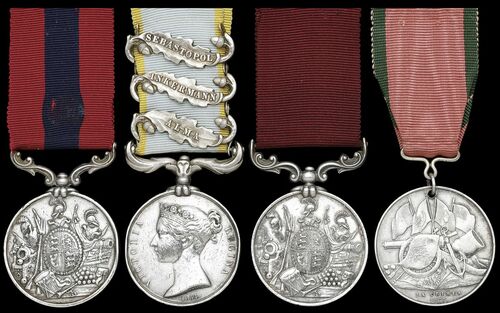
Auction: 23003 - Orders, Decorations and Medals
Lot: 141
A Crimean War D.C.M. group of four awarded to Brigade Sergeant-Major R. Emmerson, Royal Artillery
Distinguished Conduct Medal, V.R. (Corpl Robt Emmerson, Royal Arty); Crimea 1854-56, 3 clasps, Alma, Inkermann, Sebastopol (Robert Emmerson. B. Bat...ry. R.A.), engraved in upright capitals; Army L.S. & G.C., V.R. (120 Serjt Robt Emmerson 3rd Brigde R.A.); Turkish Crimea 1855, Sardinian issue (R. M. Emmerson. R.A.) engraved in upright capitals, fitted with ornate suspension contact wear throughout and some rubbing to naming details in places, very fine (4)
D.C.M. confirmed in the Royal Artillery General Orders 21 August 1855.
Robert Emmerson was born in February 1827 from Aldborough, Suffolk and attested for the 3rd Battalion, Royal Artillery at Ipswich, Suffolk, on 17 June 1846. He was promoted Bombardier on 1 April 1853, Corporal on 13 July 1854 and to Sergeant on 21 August 1855. During the Crimean War he served in 'B' Battery under the command of Captain C.T. Franklin and was present for over two years.
'B' Battery at the Battle of the Alma
When the deployment of the Light Division was completed, 'E', 'G', and 'B' Batteries moved forward and came into action, 'B' Battery, on the right, was subsequently moved to the left flank of 'G'. The range being found to be beyond the reach of our 9-pounders, their fire was reserved and the first line lay down. Then, awaiting the effect of the French turning movement, Lord Raglan's forces remained under the fire of the Great Redoubt, and it was during this pause that 'B' Battery lost their Second-Captain, Armine Dew, who was killed by the splinter of a shell.
Sebastopol - McKenzie's Farm
It was Lord Raglan's intention to make his way through the steep and densely wooded country to his front and strike the pos-road where it crosses the high ground near McKenzie's Farm. A narrow woodland road, which was shown on the map, appeared to lead to this place and Lord Lucan was ordered to move along it, taking with him some of the cavalry, including the Greys, I Troop R.H.A. (Captain Maude), and a detachment of the Rifles. He was to be followed by the 1st, 2nd and Light Divisions, who were ordered to break throughthe trees and brushwood as best as they could, and steer by compass if necessary. B, G, A, and H Batteries received orders to march at once, without waiting for the infantry divisions, and the long column of guns and wagons advanced along the narrow way taken by Lord Lucan, until their further progress was barred by finding I Troop halted in front of them. The cavalry general, after following the direct road for some time, had diverged to his right and taken a by-path which eventually "degenerated into a mere track and at last disappeared altogether". It thus happened that the Rifles and cavalry were no longer leading the advance on McKenzie's Farm.
Inkermann
The 6th Battalion, bearing off to its left and being remote from the combat just described, drove back our pickets towards Hill Bend, where Captain Bellairs had three Companies of the 49th Regiment, with B Battery on his left. Lieutenant Arbuthnot was in command of the guns at this moment. Judging, from the sound of the infantry fire coming closer and closer, that our troops were being driven back, he loaded all six pieces with case-shot and waited. Bellairs' men kept doubling back by twos and threes till they were all in rear of the guns. The leading Russians then appeared in the open space which had been cleared in front of the breastwork, and Arbuthnot instantly fired a salvo of case. This momentarily checked them, but the Russians advancing with great bravery, had almost reached the muzzles of the guns when another salvo was fired in their faces. While the attackers were reeling under the effect of this discharge, Arbuthnot, who was in the centre of the battery, with Bellairs close beside him, cried, "Now is your chance?" Bellairs instantly gave the order to charge, and his men- he had only 183- sprang to the front with a cheer, and drove back the vastly superior forces opposed to them at the point of the bayonet.
The Russians left flanking party, finding no infantry in their front, marched unmolested up the Home Ridge towards the position held by B Battery, which at once opened fire upon them; but at first without effect, for the guns were laid too high. Captain Yelverton, the Adjutant of the 2nd Division Artillery, from the vantage of his saddle noticed this waste of ammunition, and, hastily dismounting, he himself depressed one of the guns which thereafter spread their case-shot with such effect that the assailants retreated down the hillsde with heavy loss.
During the Battle of Inkermann 'B' Battery suffered 4 other ranks killed and a further 17 wounded. Two limber wheels disabled and two limber boxes and one shaft damaged plus the loss of many horses. During the engagement they fired 293 round shot, 58 shrapnel, 18 case-shot, 58 common shell with Howitzers firing 75 shrapnel (503 in total) which is more than any other Battery involved, and accounted for almost a quarter of all ammunition expended by the Artillery during the Battle.
Emmerson followed his Crimea service in Corfu for a total of 2 years and 9 months. He transferred to the 3rd Brigade on 1 May 1859 and qualified as an Instructor of Gunnery at Shoeburyness in 1860, and was promoted to Brigade Sergeant Major on 4 September 1867. He served in Malta for 5 years and 3 months before going to Canada for 6 years. Emmerson was finally discharged at Halifax, Nova Scotia, Canada on 26 September 1871.
Subject to 20% VAT on Buyer’s Premium. For more information please view Terms and Conditions for Buyers.
Sold for
£2,000
Starting price
£1100




